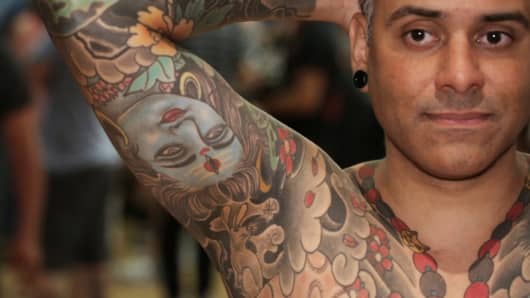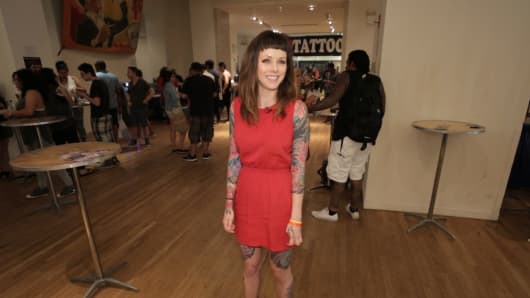<iframe
src="http://player.cnbc.com/cnbc_global?playertype=synd&byGuid=3000398666&size=530_298"
width="530" height="298" type="application/x-shockwave-flash"
allowFullScreen="true" bgcolor="#131313"></iframe>
How much would you spend on a piece of art that's guaranteed to go with you to the grave?
For one tattoo enthusiast, the answer is $55,000, and growing.
Jesus Ayala, a custodian handyman living New York City's Washington Heights, has been tattooing his body for the past 15 years. His legs, arms, torso and back are fully covered, with colored images of Hindu and Japanese gods, but his body suit isn't completely finished.
"I'm planning on doing the top of my head before the end of the year. And when I'm an old, wrinkly man I'll do my hands and I'll do my neck," Ayala told CNBC in a video interview.
Ayala estimates he'll spend another $1,000 on his head tattoo.

Sophie Bearman | CNBC
Tattoo model Jesus Ayala shows off his tattoos at the NYC Tattoo Convention in June.
According the IbisWorld, consumer demand for tattoos is growing as cultural taboos surrounding the industry lessen. In 2012, 21 percent of adults had tattoos, up from 14 percent in 2008. That's according to the latest data available from Harris Interactive.
In addition, demand for cookie-cutter shapes is decreasing as individuals prefer customized tattoos that involve more intricate designs.
By 2020, revenue from the tattoo industry is expected to surpass a billion dollars, according to IbisWorld.
Despite growing popularity, tattoos may still prove costly, and not just because of the steep hourly rate many tattoo shops charge.
IbisWorld cites a 2011 survey by the Center for Professional Excellence at York College of Pennsylvania in which 57 percent of human resource managers said a job applicant's chances of scoring a job would be hindered if that applicant had a tattoo. That percentage actually increased to 61 percent of managers in the same study one year later.
While the number of Americans with tattoos is growing, the workplace may not have entirely caught up.
Ayala said being tattooed is a challenge, but perceptions are slowly changing.
"Every day of my life I have to educate people and let them know that we're not bad, we're good people, we just have different skin than you now," he said.
"The way I feel about the tattoo community now is that we've grown. We're part of life. There are doctors, lawyers, police."

Sophie Bearman | CNBC
Tattoo model Megan Leahy shows off her body suit at the NYC Tattoo Convention in June.
Megan Leahy, a private events coordinator and bartender living in Richmond, Virginia, has spent an estimated $10,000 on her body suit. She has covered her arms, legs, and ribs with black, red, and blue Japanese floral designs.
"You buy art to put on your walls. But when you're putting it on yourself, it feels transformative," she told CNBC in a video interview.
She added that she hasn't received negative attention in public.
"I get a lot of compliments, just because it's not piecey or bad work. I feel like people are really starting to appreciate tattooing as a real art form," she said.
No comments:
Post a Comment